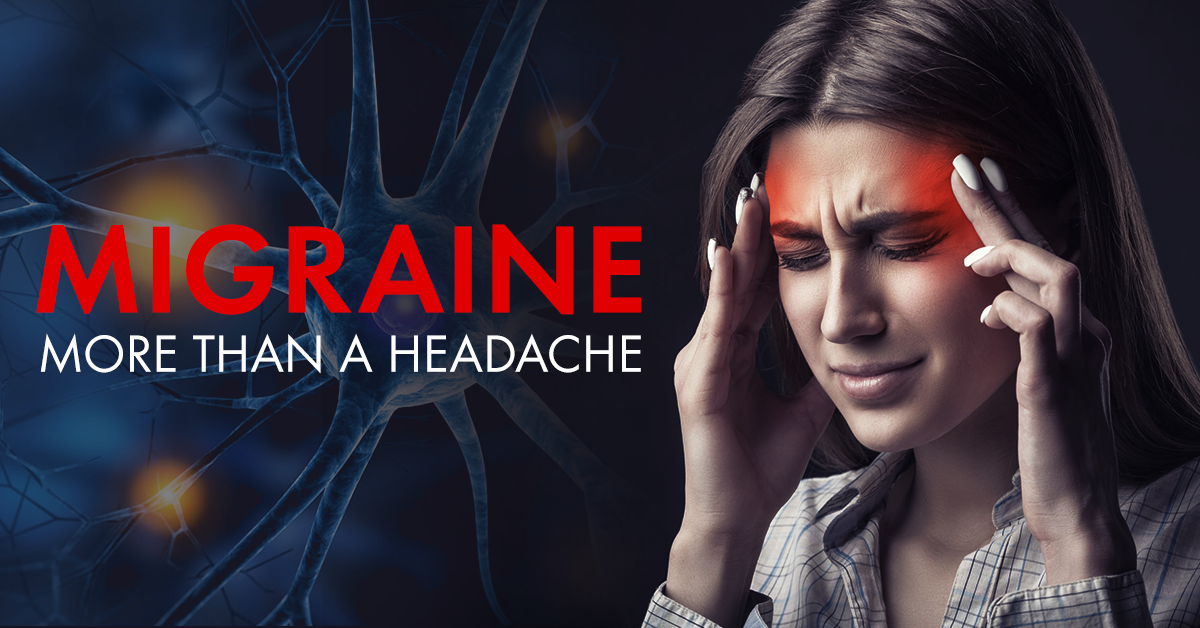
Migraine is the most common form of headache, but not all headaches are migraines. The term “migraine” refers to a headache that is usually (but not always) on one side of the head.
The Beginning
It most commonly begins during puberty or young adulthood, waxing and waning in frequency and severity over the ensuing years and usually diminishing after age 50. Migraine is a centrally-mediated pain disorder. This means that there is a disorder in the central nervous system (the brain and spinal cord), involving the nerves and blood vessels, which results in the pain and the neurologic symptoms associated with a migraine headache.
What causes migraines?
Migraine is a genetic and chronic disease like asthma or diabetes, not a psychological or social condition. The pain results from signals interacting among your brain, blood vessels, and surrounding nerves. During a headache, specific nerves of the blood vessels are activated and send pain signals to the brain. It’s not clear, however, why these signals are activated in the first place.
There is a migraine “pain center,” or generator, in the mid-brain area. A migraine begins when overactive nerve cells send out impulses to your blood vessels. This causes the release of prostaglandins, serotonin, and other substances that cause swelling of the blood vessels in the vicinity of the nerve endings, resulting in pain.
Migraine Symptoms
Nausea is one of the most common symptoms and it worsens with activity, which often results in patient disability. Other common symptoms include:
– Eye pain
– Sensitivity to light or sound
– Feeling very warm (sweating) or cold (chills)
– Pale color (pallor)
– Feeling tired
– Dizziness
– Vomiting
– Loss of appetite
What triggers a migraine?
Things that can make the headaches more likely to occur include:
– Changing weather conditions such as storm fronts, barometric pressure changes, strong winds, or changes in altitude
– Bright light, fluorescent light, flashing lights, sunlight
– Tension, anxiety
– Being overly tired
– Overexertion
– Missing meals, dieting, or not drinking enough liquids
– Changes in normal sleep pattern
– Loud noises
– Exposure to smoke, perfumes, or other odors
– Certain medications that cause blood vessels to swell
– Overuse or daily use of headache-relieving medications
What are the types of migraines?
There are several categories of migraines:
– Common migraine has no “aura.” About 80% of migraines are common.
– Classic migraines (migraine with aura) present with an aura before the headache and are more severe than common migraines.
– A silent or acephalgic migraine is a migraine without head pain but with aura and other aspects of migraine.
– Hemiplegic migraine can have symptoms that mimic a stroke, such as weakness on one side of the body, loss of sensation, or feeling “pins and needles.”
– A retinal migraine causes temporary vision loss in one eye, which can last from minutes to months, but it is usually reversible. This is often a sign of a more serious medical problem, and patients should seek medical care.
– Chronic migraine is a migraine headache that lasts for more than 15 days per month for three consecutive months.
– Status migrainosus is a constant migraine attack that lasts more than 72 hours.
It is important to know what type of headache you have because management varies greatly for different headache types.
What is the best treatment for migraines?
There is currently no cure for migraines, however, as with other chronic diseases, we are becoming increasingly skilled in managing the condition. This means taking measures to identify the triggers that bring on headaches, modify lifestyle to avoid them, and use medications and other therapeutic modalities to treat headaches when they occur.
Overview
The bottom line is that migraine can be managed, but it requires vigilance, openness, attention to detail, awareness of your environment and the help of a knowledgeable, involved, and compassionate team of healthcare providers to gain and maintain control and to evolve the treatment plan as your life evolves. Every migraineur is different and no website will replace a careful history and examination with a qualified headache specialist.
Regency Hospital has a dedicated team of Neuro experts backed by world-class facilities and advanced treatment options.

 Call-an-Ambulance
Call-an-Ambulance



